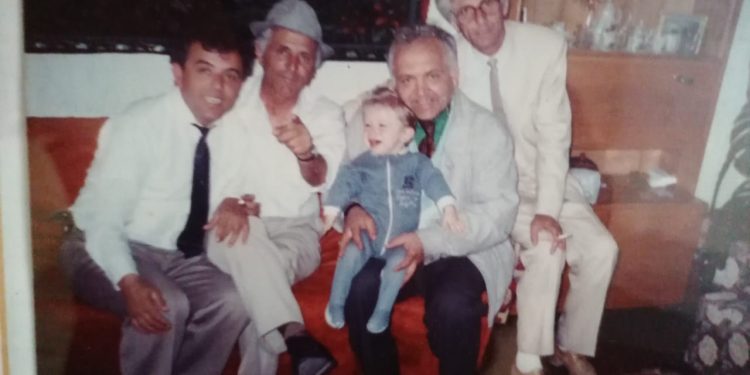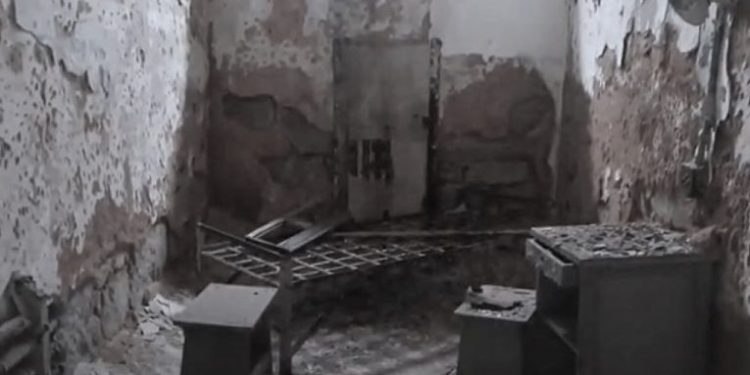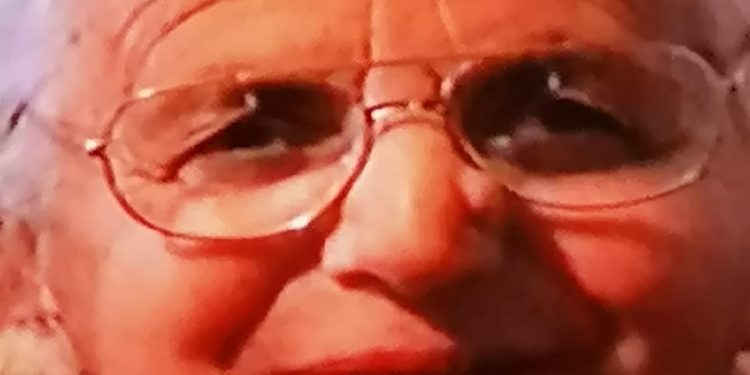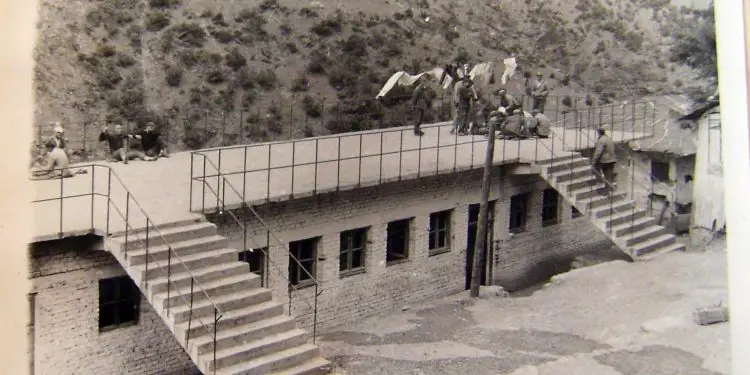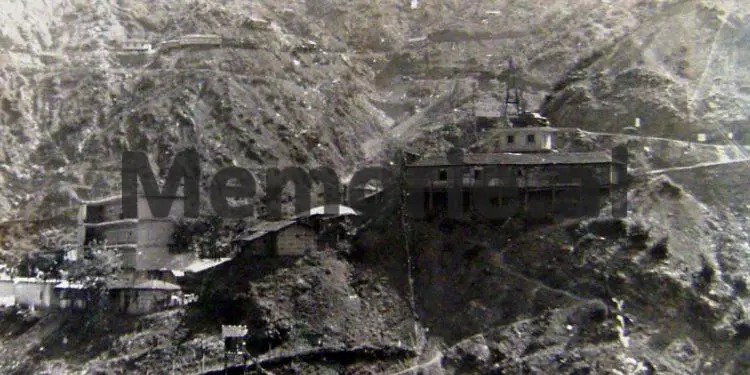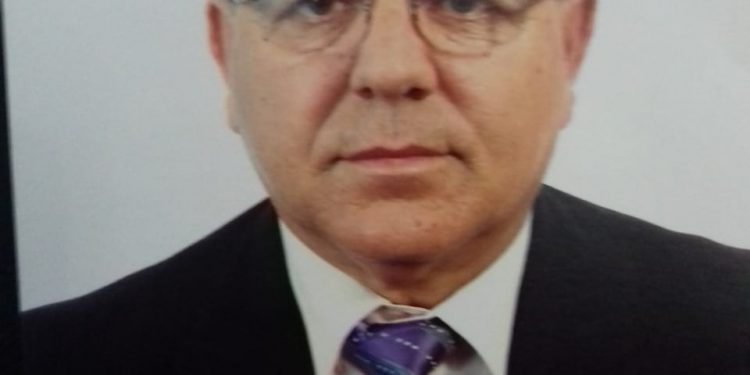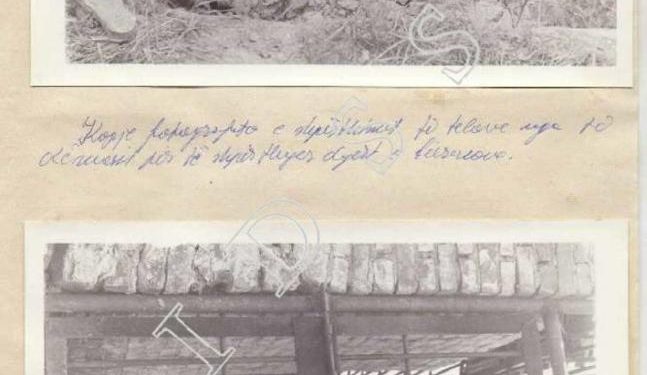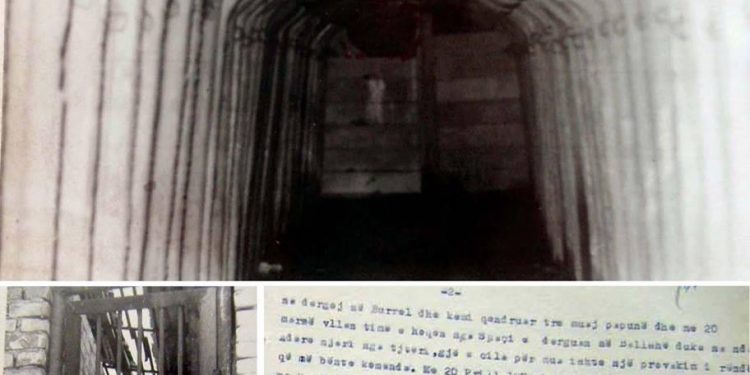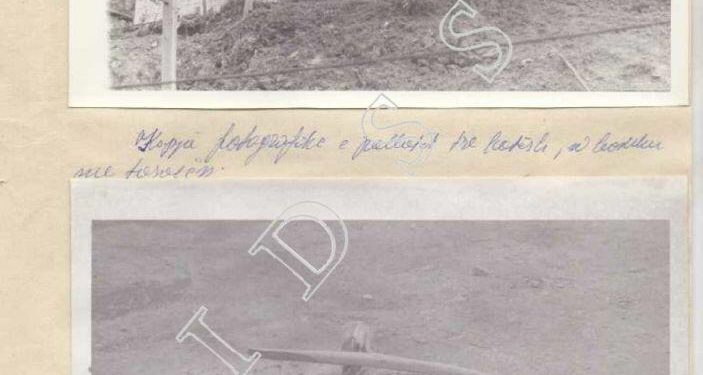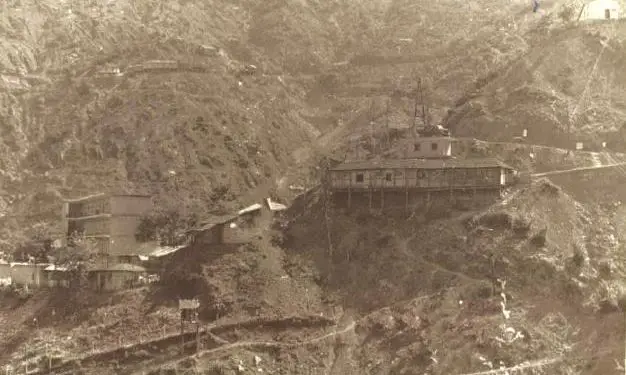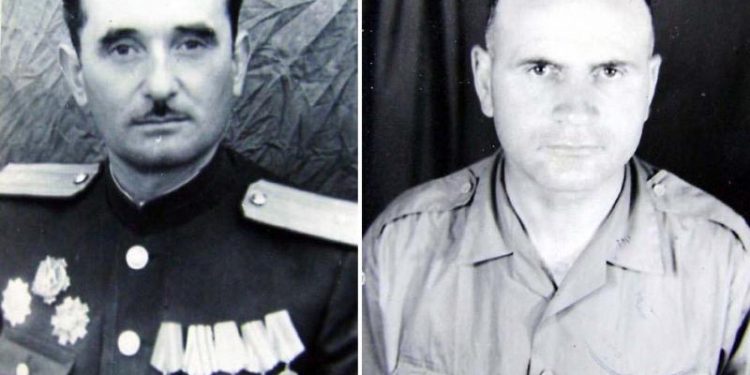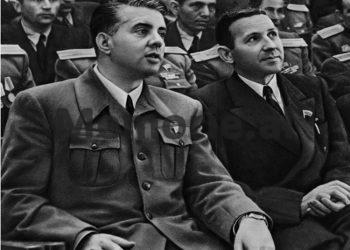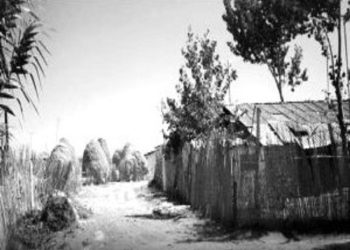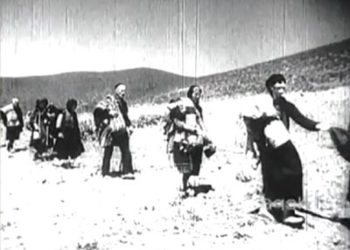By Bedri Çoku
The third part
Memorie.al publishes the unknown testimonies of Bedri Çoku, originally from the village of Muçias in the district of Lushnja, who at the age of 19, while performing compulsory military service in the district of Gjirokastra, was arrested by two senior State Security officers and after a “unmasking” public trial with accusations mounted in the cinema of that city, he was convicted for agitation and propaganda together with his brother, Çaushi, for the only “fault” that their father had suffered several years as a prisoner in the forced labor camps from where he was released in 1959. The rare testimonies of Bedri Çoku who spent 24 years in the prisons of Spaç, Burrel and Qafë Barit and together with his two brothers, Esat and Çaushi and their father, Azem, suffered 64 years in prison in the camps and prisons of the communist regime of Enver Hoxha, being released only in February 1991. Memoirs of Bedri Çoku masterfully described in his book “The uprising that shook the dictatorship”, which where is mainly added to the Spaç Revolt in May 1973, where he, as one of its main organizers, sheds light for the first time by making public some unknown events and facts from that revolt where the flag was raised without the red star of communism, and until his work as General Director of Camps and Prisons after the ’90s, where he “arrested” his close friend, the accomplice of the dictatorship’s camps and prisons and sent him to the cells of’ Prison 313 ‘. Tirana, where most of the former Political Bureau of the Central Committee of the ALP headed by Ramiz Alia and Nexhmije Hoxha were serving their sentences.
The uprising that shook the dictatorship
(Based on a true story)
“To raise the flag, without the communist star, I expressed the opinion that, unable to find a red sheet, we would break our hands and, with our blood, paint the white cloth…! The first to cut his hand with a knife was my brother, Çaushi, the second Gëzim Medolli, Bedri Çoku, Gjet Kadeli, Ulsi Pashollari, and others…”
We very much hoped for European Security and Cooperation which was being carried out at a dizzying speed under the special care of the United States of America. Rightly all mankind was eagerly awaiting the great historical moment. Signing for the Understanding of the Peoples of Europe, Western Democratic States and Eastern Communist States, which were still suffering from dictatorial regimes, to establish together a new order of peace and cooperation in the world. We hoped that Albania on this occasion as well. She would sign in Helsinki this Act for the Fates of Humanity, as a representative of this International Political Organization. We were convinced that our country, though incomparable to the countries of the East, would, by grace or by accident, join the Treaty of Peace and Cooperation with Europe (OSCE).
author
Continued from the previous issue
REBELLION
He pretended to be sorry, for what he was hearing from them, and solemnly vowed to meet all their demands, and even pulled out of his own pocket a great deception, claiming that the long time, over ten years without making any apology from the Presidium of the People’s Assembly, to political prisoners, could probably be one of the reasons for the outrage, to this extent. He vowed to propose to the government to resume pardon for political prisoners, which, according to him, probably due to the conditions created by the bourgeois-revisionist siege of the country, had forgotten without any ill intentions the element of their pardon. from the Albanian state. We shouted and mocked, insulted the “Bourgeois-revisionist Siege” that was done to us, reminding the director that only ordinary prisoners, thieves, rapists and murderers were forgiven for weak motives.
He showed solidarity with the fair grievances and undertook to make those serious problems in government, but on the condition that he give up the revolt, go to work to carry out the plan set by the state, and allow the guards of the internal service. to exercise their duty. Otherwise, those who would not comply with these obligations, according to him, surely the law would act harshly for the sabotage caused by abandonment of work and disallowing the functioning of the state police, at work and inside the camp.
He strongly objected, saying that he would never go to work, expressing his determination to continue the revolt, until the necessary demands were met. However, against the resistance was the “opposition” of the camp, which until now constituted the majority. It caused the Director-General to be released from the camp, even releasing them to allow internal service officers to continue on duty inside the camp. For the sake of truth, the “opposition” allowed the command police officers to continue their service in the camp, on the condition that they no longer have any business with Pal Zefi and the prisoners who clashed fiercely in the morning with the command guards.
For Tomor Allajbeu and some others who were suffering in prisons for various reasons, the “opposition” demanded that the remaining sentence be lifted. But, before the paint of promises had dried, the General Director, instead of keeping his word about the conditions set with the “opposition”, ordered the police officers from Rrëshen to enter the camp, to arrest Pal Zefi and some of him. prisoners who stood out in the morning brawl. Initially, the first to be called to the Technical Office was Syrja Lamen, from Rëmbeci in Korça, who had stood out in the morning clash. (The Technical Office was the office of the head of the prisoners, a political prisoner, appointed by the command, as the man who represented the interests of the prisoners and the command in all mutual links).
Syrja Lamen was probably taken to command, to clarify a few things. He was actually handcuffed and taken to a dungeon. While, when they took Pavlo Popa, from Shkodra, as one of the most active in the morning fight, one of the prisoners, who was closely following the movements of the police inside the camp, released the call to unite all against the police officers who were arresting Paul Pope. The clash was furious with all the force of hatred. Although the police were more numerous this time than they were in the morning clash, led by the camp operative, Fejzi Liço, together with the officers and police officers of the Rrëshen Internal Affairs Branch, the clash became bloody… Many were injured on both sides, and there were even lying unconscious.
Without the slightest discussion that the victory belonged entirely to the political prisoners, already united with them, almost more than half the camp, using all sorts of strong tools, which they had at their disposal, against the rubber truncheons and pickaxe tails, as equipment that police officers used to defend themselves against us. This time they barely dragged each other, seriously injured or in a completely unconscious state. They escaped possible by handing over the camp, finally, to the hands of the insurgents …! One of the detained witnesses, the former doctor of the camp, Muhamed Kosovrasti, after the uprising was barbarically suppressed by the special forces of the army and the Rapid Intervention of the state police, in one of the many court hearings, for the retrial of the insurgents, in The People’s Court of Rrëshen, in the group where I was, to the question of the chairman of the session, how the revolt inside the camp was born and took place and who were the main organizers, he answered with conviction that he was saying, before the court, a truth of large:
– “I say with my full responsibility, Mr. President”, he said, “that the revolt had a perfect organization, by people who were not known by us, but also by many other prisoners …”! He was right. We each had defined tasks. Fadil Dushku, for example, Demir Pojani, and Dervish Bejko, were assigned to guard prisoners known as command informants, to prevent them from communicating with the operative, beyond barbed wire. As violent people against spies and immorals, most of whom crouched like rats in front of them, in fact they performed this task brilliantly. The only person who tried to communicate with the command was the imprisoned doctor, Muhamed Kosovrasti. He was caught red-handed by the frightened trio, with the letter hidden in the tension apparatus, during the secret meeting with the command man, near the siege wires, to give him written information about what was going on in the camp and who they were. the main people, according to him, who led the resistance.
The doctor tried to justify himself, most likely that the tension apparatus had been requested by the people in command, for an emergency, while the written letter was conveyed out of fear in the stomach…!
He deserved a beating, as the boys knew! Meanwhile, Qemal Demiri from the village of Vajzë in Vlora, with his friends and Gjoka with a big mustache from Dukagjini, took on the task of burning the stands and books in the prison library, together with the works of Enver Hoxha and the classics of communism, as and of the writers of socialist realism, so that their burning became visible and ceremonial, in the camp yard…! To make the fire bigger, many prisoners took part in these actions, but those who had fun with the increased flames were Fadil Dushku, ubiquitous and Fatmir Llagami, from Tirana, Xhemal Bali, Gëzim Medolli, Gëzim Çela and Sadedin Taipi and others, preparing calls with demands that orators would announce aloud, on the terrace of the three-story palace to the Great Powers, such as America, the Soviet Union, Great Britain, France, Germany, China, and the UN, the demand that they turn their heads even from the small Albanian people, to save them from the inhuman and hated regime of the communists.
They prepared slogans to chant against the regime and the main leaders of the party and the state, especially to listen to the people who were watching viciously around the camp. Because we had liberated 2,000 square meters from the bloody communist clutches and were endlessly chanting slogans and curses, the Mirdita authorities were simultaneously forced to fill open trenches around us, with armed volunteers, one of their most trusted, to shoot us. as soon as we broke the siege of the camp. The commanders urged us to surrender as soon as possible, because, otherwise, they declared, the punishment would be more severe for all, the more we resisted. We responded flame to flame to them, repeating over and over our slogans: “Down with Communism” “Down with Enver Hoxha, the greatest criminal in the world” “Long live Security and European Cooperation”, “Long live America”, “O Death, O Freedom”!
We had a case, fortunately surprising, unforeseen, with the 23-year-old boy, Skënder Daja, a young prisoner, after he had tried to escape from Albania to Greece. He was carried on the shoulders by his comrades and he spoke to his peers, the soldiers, in the siege posts, but who also listened to him, and the volunteer people in the trenches, with heartfelt words that they should distance themselves from the orders of their leaders, criminals…! The soldiers were told that he had been, like them today, in the compulsory military service, but left to leave Albania, for a better life, because in our country completely ruled the communist terror and its enslaving system …!
“I’m sorry,” he said, “that, when you are released from military service, poverty awaits you, the threat of imprisonment if you do not obey the enslaving laws of the cooperative state.” Do not trust your demagogic officers, who tell you about the lives of people in Albania, as the best and happiest in the world. Believe me, brothers, if this were true, there would not be so many political prisoners and internees, there would be no borders surrounded by barbed wire, there would be no people waiting in line for hours for to get a liter of milk, or a few liters of kerosene…! There would be no Albanians, who can barely feed the toads…! Think for yourself, when you are released from military service, how many opportunities will you have in the agricultural cooperative, where you will live on only thirty or forty ALL per day, after a tiring and exhausting work…! How do you say, can you build in these conditions a free and happy family, when your children will suffer from hunger”?! His words were interrupted from time to time by the cheers of his accomplices.
He spoke for almost twenty minutes, of course assisted by the comrades who carried him on their shoulders. It was upupil e’s bold call, as everyone in the camp called him, because he was small, that forced the commanders to issue an extraordinary order to remove the soldiers from the garrison. They were immediately replaced by special police forces from the Rrëshen branch of internal affairs…! No soldier appeared after the famous speech of the brave boy, Skënder Daja. This act was shocking, because from moment to moment he could be shot, for his words addressed to soldiers and armed men across the wires, to distance themselves from the orders of their officers, criminals…! Or for the orders, when they were released from military duty, which awaited only poverty and the threat of imprisonment, if they did not obey the enslaving laws of the cooperative state.
These words could only be said by a hero, whose act would undoubtedly be punished one day by the bullets of the treacherous clique, to remain unforgettable on the altar of the nation’s martyrs, for freedom and democracy…! The plan to urgently release the comrades who were in the dungeons was taken over by Ulusi Pashollari, one of the brave activists who drew the dangers, with whom Dashnor Kazazi, a close friend of Skënder Daja, voluntarily joined. The two of them, after crawling through the ceilings of the silos, without being noticed by the guards in the sheds, went down to the courtyard of the dungeons and slammed their doors with levers and beaks. At this time they were spotted by the siege policemen, who opened fire at once. Amid the machine gun fire and the whistling of bullets, they escorted their comrades from the dungeons until, all together, they reached safely across the barbed wire, where the crowd of accomplices had scorched them and waited anxiously for them, in the courtyard of the liberated…!
The great echo of our joyful shouts erupted in response to the gunshots, beyond the barbed wire, as soon as they all arrived among us…! In these unrepeatable sublime moments, surely God’s saving hand was the one who averted the bullets of the machine guns and automatic rifles, directed by those who had come out of the dungeons and ran to join the “liberated” comrades, thankfully without any prisoners being injured. Otherwise, even if one of them, running towards the liberated courtyard, to save his head, was killed, the course of events would surely have taken another path. The crowd completely exalted by the death of one of their comrades-in-arms, would surely have acted flame for flame, with the offensive means we had provided, no matter what would happen next, between us and those who kept us surrounded… !
After this extraordinary success, my brother, Chaushi and I, unjustly convicted of agitation and propaganda, were relaxing sitting on the bathroom terrace, watching the great fire in the middle of the courtyard, where the flame was rising in the sky, from the blazing fire. of the works of Albanian and international communists. Meanwhile, I followed Luke and some of those who acted in complete conspiracy to carry out the decisions taken. I was heartbroken to see him satisfied with what we had accomplished so far. To our surprise, a co-sufferer, with whom we did not know so well, Gjet Kadeli, who was from Oroshi i Miriditës, recently convicted of agitation and propaganda, approached us as if he had warmed himself by the big fire. , I do not know why he wanted to stay in our society.
I did not feel well. He had respect for us, the brothers, for our correct attitude towards our comrades and, “cut” with those in command, he told us before he sat down. He was married and had four sons. Kindly told us about his father, who had escaped from Rrëshen dungeons and straight to America. Satisfied with this fact, however, he told us that, for many years, he communicated with his father by letters and continued to communicate even after his conviction. He even sometimes found fifty or one hundred dollar bills inside the papers. Impatient, from the fact that Gjeta was communicating with his father, I asked him how much opportunity he had, in America, to learn about what was happening in this prison ?! He said that he had no idea, but that it would be a great thing if the fleeing Albanians found out what was happening in Spaç prison…!
His response instantly ignited the idea of raising a flag on the terrace of the three-story palace, for the fleeing Albanians to feel proud of their sons, grandchildren, acquaintances or relatives, who, God willing, are were sacrificed to arouse the interest of the whole world, for help, to be freed from the black mortal of the communist regime. He told me, “Yes. You are right. They will rejoice… ”! I loudly issued the call to prepare a flag, without the communist star. The first to approach overjoyed at what he heard from my mouth was the ubiquitous, famous Luke. After him came others, Gëzim Medolli, Dervish Bejko, Kostandin Papa, Naim Pashaj, Ulusi Pashollari, Murat Marta, Gëzim Çela, Demir Pojani, Feti Kumanaku, from Fieri, Elez Hoxha from Tropoja and many others, who immediately showed solidarity for raising the flag of Skanderbeg and Ismail Qemali … Thoughts clashed to find the right clothes, where the eagle with two heads would be painted.
I expressed the opinion that, unable to find a red sheet, to split our hands and with our blood, to dye the white sheet. This opinion was approved, there was even applause. The first, without hesitation, cut his hand with a knife, my brother Çaushi, the second Gëzim Medolli, then me, Gjet Kadeli, Ulsi Pashollari and others. Unfortunately, the blood in the thick calico fabric did not stick as we wanted. The word that a national flag would be raised, without the communist star, had taken hold. Suddenly, as if sprouting from the ground, dozens of people dispersed to find the meringue of our National Flag. As soon as he closed his eyes, they brought some pieces of red color, but none of them was found suitable by the improvised “commission”…! The red piece, made for “Our Flag of the Uprising”, which was liked, was the cover of a quilt from Maqellara of Dibra, whose owner was the prisoner from Dibra, Rexhep Lazëri. Because the command painter, Robert Morava, a political prisoner who had only been involved in preparing the slogans and the stand ordered by the command, had the opportunity to realize the two-headed eagle on the flag, it was not realized. /Memorie.al
Continues in the next issue





